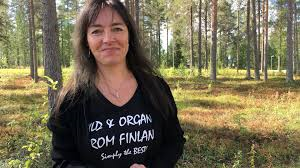Birgitta Partanen has always been interested in nature. Her career as a project manager and now as a doctoral candidate has also the special emphasis on utilizing nature-based products. Current research maps out the possibilities the organic certification of forests will bring the forest owners as well as entrepreneurs in natural product sector.
Almost all forests in Finland could be certified as organic collection areas without changing current forest management practices. The certification would create new possibilities to utilize our clean forests more than before.
- Forests are more than just wood or timber. For example, the superfoods imported to Finland could be easily replaced with local products, Partanen emphasizes.
The organic certification of the forests would diversify sources of livelihood and create opportunities to innovate new products. For example, the forest owners and organic entrepreneurs would benefit in various levels. In Finland the forest can be certified at the same the organic farm is inspected.
- There is a real need to increase funding for this field of research in order to commercialize the non-timber products, Partanen states.
In Finland the organic collection area is 12,2 million hectares (situation in 2016), and it is mostly situated in Lapland and in north-east areas. This amount is about 30 % of all organic collection area in the world, and about 40 % of Finland´s land area.
- Natural product sector could be the new Nokia in Finland, if the possibilities of the forests are acknowledged and invested, Partanen encourages.
If all the forests qualified for organic were certified, the whole organic area in Finland would cover 87 per cent of the Finland’s land area, the agricultural area included.
- In Estonia, all state forests (40 % of the whole forest area) were certified quickly. We could be as prompt in Finland, too, Partanen ends.
The dissertation The organic certification of forests – images, meanings and possibilities has been funded by Finnish Cultural Foundation, South Savo Funds, the Fund of Sisko and Jaakko Viipuri. The research was presented in international organic conference held in Mikkeli 19th– 21st of June, 2017. The conference gathered over 90 researchers from 13 countries to discuss the current research topics in organic farming sector.
- More information: www.njf.nu/seminars/mikkeli2017
- The conference material will be published in Organic ePrints: www.orgprints.org
